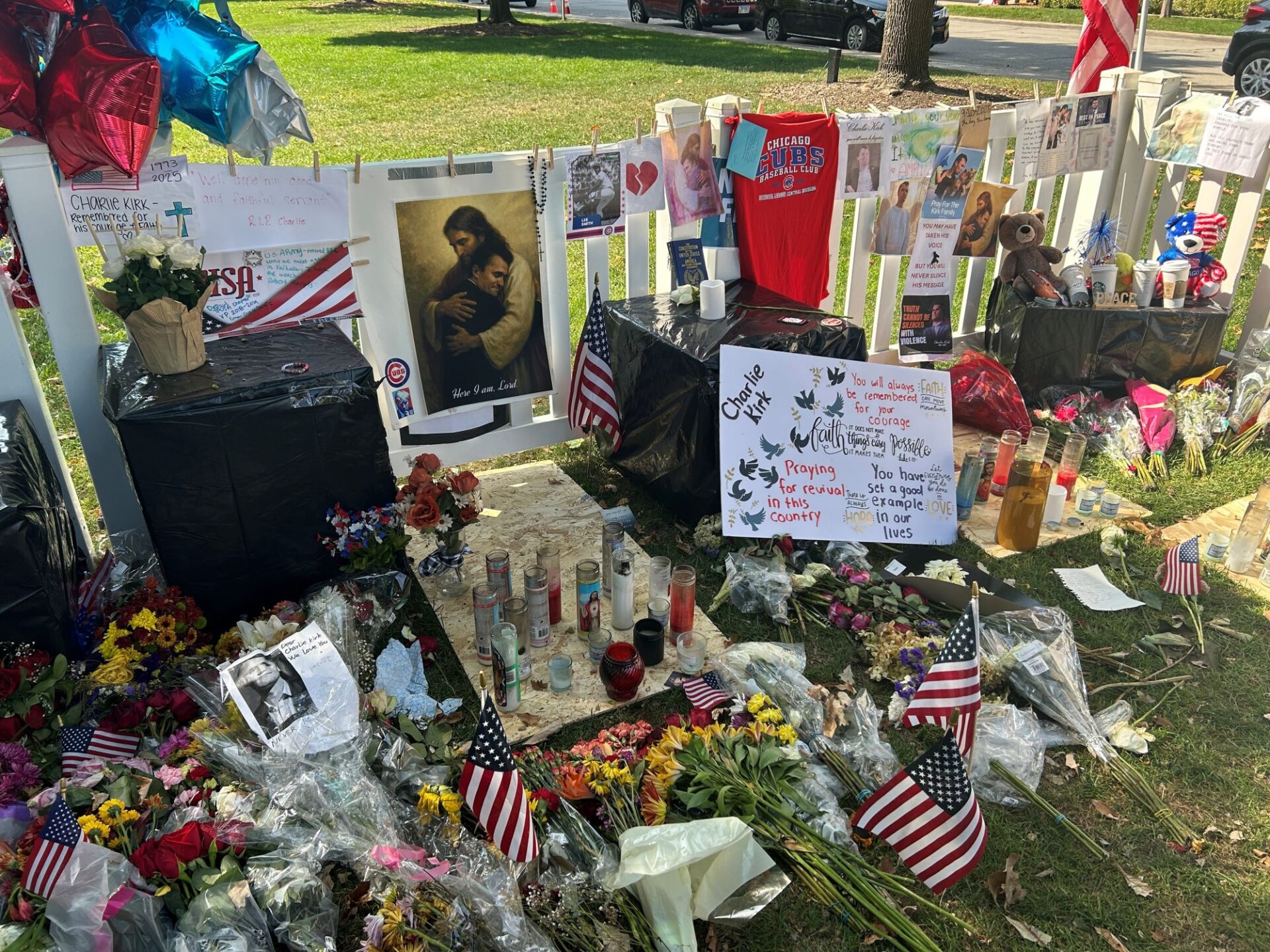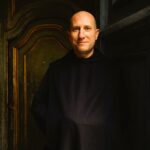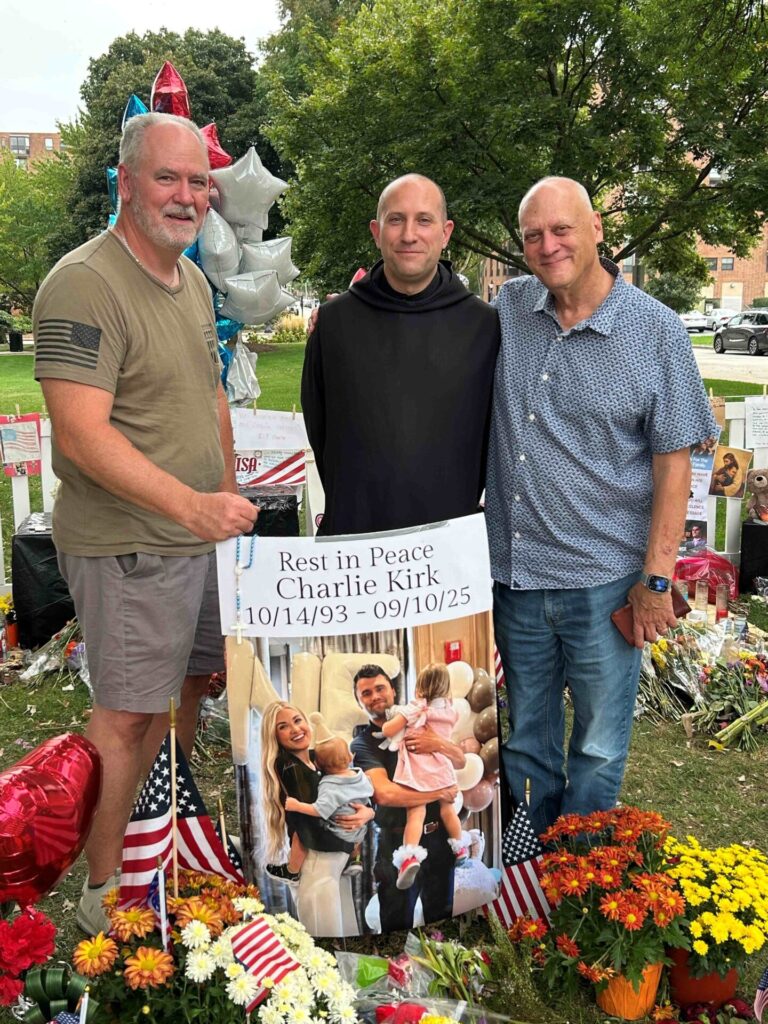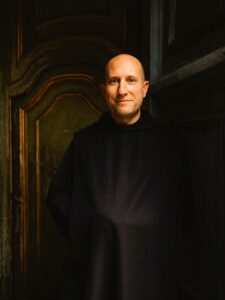I was born and raised in the same Arlington Heights, Illinois town as was Charlie Kirk. Like him, I grew up an evangelical Christian. From the outside, our similarities might seem to end there. My own surprising path ultimately led me to the Catholic faith, to celibacy and a priestly vocation, while Charlie’s path led him to conservative advocacy, to raising a family, to the thick of America’s public square. Yet despite this contrast, everything I have learned about him seems to suggest that we share in common a desire to commit our lives to the service of others as well as to something greater than ourselves: he in the political realm, and I in the ecclesial.
If the past few weeks have shown anything, it is that I am not the only one to feel a kind of kinship with Charlie. What was it about him that allowed him to embody so powerfully the values of so many Americans? On September 20th, I returned to our hometown and stood at the makeshift memorial in North Park honoring his legacy. There, among the flowers and flags, I listened to the voices of neighbors and strangers who had come to remember him. What I heard surprised me.
The Things That Last: Charlie Kirk’s Legacy
The first person I met at the memorial was Tom Hoskinson. He kept watch for hours at a time, sometimes even through the night. Hoskinson had driven in because Arlington Heights was the nearest town holding a vigil on the Sunday after Charlie’s assassination. When I asked what drew him to Charlie, he didn’t hesitate. “Charlie welcomed all voices,” he said. “It didn’t matter your sex, your gender, your religion, or your race. He invited all to have a dialogue.”
As we talked longer, his thoughts turned from Charlie to the state of the country.
There are so many things going on today. I think we need to get back to some common core—Judeo-Christian values, positive values. Something’s got to change. We’ve got to go back in time a little, in spirit at least. I’m not saying we should take away women’s rights or stop people from exercising their freedom. No—do what you need to do. But we’ve got to recover the basics.
These values are common among conservatives in the US; indeed, there is little in what he said that any American would object to. They also point to something larger, a belief in something permanently valuable. The American essayist Russell Kirk, writing about the American conservative, observed that: “The typical conservative in this country believes that there exists an enduring moral order. That order is made for man, and man is made for it: human nature is a constant, and moral truths are permanent.”
In the Midwest, such beliefs tend to be ingrained in the back of people’s minds. Events like the assassination of Charlie Kirk remind people of the need to protect them. Nevertheless, right and wrong aren’t considered to be private preferences here; they are the lights that guide public life and debate.
Charlie Kirk often used the word permanent in a way different than Russell did. For him, permanent usually referred to entrenched habits, bureaucracies, and illusions that conventional wisdom had declared immovable: the “permanent bureaucracy” of Washington, the “permanent welfare state,” the assumption that endless wars or crushing student debt were simply fixtures of modern life. Again and again he insisted that what many people called permanent could, in fact, be challenged and changed. “Few things are as permanent as a temporary government program,” he quipped, echoing the cynicism of a generation that had seen reformers turned into “swamp creatures.”
One Kirk reminds us what can never change; the other rouses us to change what should not remain the same.
The contrast is telling. Russell Kirk pointed to what is truly permanent—the enduring moral order grounded in human nature and divine law. Charlie Kirk exposed what was only apparently permanent—the false permanences of political habit, bureaucratic inertia, and cultural despair. One Kirk reminds us what can never change; the other rouses us to change what should not remain the same.
At the same time, even as Charlie Kirk challenged what was falsely called permanent, he lived out for a generation the things that truly endure: marriage, family, and religion. His most popular posts online weren’t about Washington intrigue or partisan feuds but about Jesus, joy, and the enduring bonds of life. One Tweet simply read, “It’s all about Jesus.” It was liked by 360,000 people. Another, “Tell someone about Jesus this weekend,” drew more than 50,000 likes. Turning Point USA highlighted one of his signature exhortations:
Get married.
Have children.
Build a legacy.
Pass down your values.
Pursue the eternal.
Seek true joy.
That message alone reached 2 million people and was liked more than 127,000 times. In a digital culture often dominated by irony and outrage, these words struck a deeper note. They point to the same “permanent things” Russell Kirk defended: faith, family, tradition, the eternal horizon. When Thomas Pearce, an Arlington Heights resident, was asked what he admired most about Charlie, he put it simply: “Charlie was a God-fearing man, and he believed in Jesus Christ.”
From Hometown to the National Stage
Born in the Chicago suburb of Arlington Heights and raised in neighboring Prospect Heights, Charlie was an Eagle Scout and a student leader at Wheeling High School. Even as a teenager he had a voice beyond our town: in 2011, at seventeen, Kirk wrote a Breitbart essay on textbook bias and appeared on Fox Business.
Charlie often recounted that the turning point for him came at Benedictine University in Lisle, Illinois, in 2012, where he met Bill Montgomery, a successful investor and Tea Party activist who became his mentor. Montgomery encouraged Kirk to forgo college and instead dedicate himself full time to building Turning Point USA. By 2025, TPUSA claimed chapters on more than 2,000 college and high school campuses. As Charlie himself explained in an interview, he recognized “an ideological imbalance on a lot of these college campuses, and [he] wanted to provide a counterpoint rooted in conservative, pro-freedom, pro-liberty, America First ideas.”
On campuses and on social media, Charlie brought Midwestern frankness and courtesy. He set up “Prove Me Wrong” tables to debate students politely rather than shout them down. Hoskinson, who has followed Charlie for years, spoke of the uphill climb that gradually turned into momentum.
When I first started following him, he’d appear on college campuses and maybe five people would show up—and all of them were against whatever he said. But over the years, you could see the crowds grow. Sometimes the opposition was even bigger than the support. But then things started to change. More people began coming out in his favor, until eventually he didn’t need the ‘change my mind’ table anymore. He would just speak on an issue, and the crowd would gather—supporters in back, and anyone who disagreed would come forward.
This opposition is by no means totally overcome. Amy Osterman, another local visiting the memorial, told me that Wheeling had included Charlie Kirk on its wall of notables in 2016, but took him down in 2020. “You can’t argue he’s not a notable alumnus,” she said. “The Cubs have recognized it, London has recognized it, even Korea has recognized it, what a shame that his own alma mater is afraid of the backlash they might receive.”
“When We Stop Talking, We Go to War”
One of the most moving moments of the national memorial in Arizona on September 21 came when Charlie’s wife, Erika, forgave her husband’s assassin. “My husband, Charlie, he wanted to save young men, just like the one who took his life,” she said. Fighting back tears, she added,
That young man. That young man. On the cross, our Savior said, ‘Father, forgive them, for they know not what they do.’ That man. That young man. I forgive him! I forgive him because it was what Christ did and is what Charlie would do. The answer to hate is not hate. The answer, we know from the Gospel, is love and always love. Love for our enemies and love for those who persecute us.
Online, thousands also celebrated the images showing Donald Trump and Elon Musk together after months of feuding. Charlie seemed to be bringing people together even in his death. Such moments pointed to the legacy Hoskinson wished to highlight: Charlie’s deep commitment to dialogue. “When we stop talking to each other, marriages fail. Countries go to war,” Hoskinson told me.
As Bishop Robert Barron recently observed, Charlie Kirk died “not with a gun or a knife or a grenade in his hand, but a microphone”—a vivid symbol that what is under attack is nothing less than free speech and the tradition of reasoned conversation itself. Barron explained that Charlie’s approach rested on a deeper conviction: “each human being is a subject of infinite dignity,” never to be treated as an object of manipulation or force.
Charlie championed the right to free speech and public assembly. At a Wheeling High School board meeting one student urged the district to honor Kirk “most importantly [for] the right of many people in America to free speech.” Another supporter noted how Charlie as a student “showed his passion for free speech and dialogue… He welcomed all voices… to have a dialogue.” One of the most common aspirations of Americans is that we all listen to one another.
This is all the more remarkable considering that Charlie was most known through social media. This ability to subvert the tendencies of these platforms is surprising, given that many interviewees lamented how social media push people apart. Hoskinson observed that online anonymity makes it easy to rant, but real-life talk builds empathy. As he put it, people becoming “keyboard warriors” lose that face-to-face connection. Charlie’s home-town memorial brought people out, talking quietly, praying together—a small-scale exercise of precisely the neighborly conversation he taught.
Every once in a while the visitors to Charlie’s memorial would be heckled by passersby. Yet when a few onlookers shouted at the memorial, volunteer watchers simply noted their anger without matching it. As Hoskinson said provocatively, if a left-wing figure had been killed in similar fashion, one might “see cities burned down… but we choose to have respectful vigils.” “Our goal isn’t to punish dissenters,” he continued “but to embody the peaceful ideals of respect and freedom of speech.”
Renee Schlenhardt, a citizen of Arlington Heights, is organizing a petition for the school district to erect a permanent memorial to Charlie. Her goal is to correct a narrative she believes has misrepresented him. She explained,
I kept hearing people label him as a racist or a misogynist, and I’m so tired of disagreement being treated as fact. It’s been like this for more than a decade. If you point out something others don’t like, they malign you, call you names, and try to silence you. I’m sick of it. What I see now is a lot of kids starting to think for themselves—learning to think critically, not just taking what’s spoon-fed to them. That’s something Charlie encouraged.
Another mother visiting the memorial told me that her daughter attended Wheeling without ever having heard of Charlie. On his own, her son discovered him and shared his respect to his mother. “You won’t believe it,” he said, “he’s from Arlington Heights!”
What should we remember about Charlie Kirk? Not simply the partisan fights or the headlines, but the values he championed: the courage to speak, the willingness to listen, and the respect to challenge young people rather than dismiss them. He trusted them enough to argue with them, to set up a table and invite, Prove me wrong. These mirror America’s deepest hopes—that our children inherit a society of freedom wrapped in responsibility, of abundance matched by compassion. Arlington Heights, like much of the Midwest, believes in practical patriotism: standing for the anthem and then shoveling the neighbor’s driveway. In that spirit, I pray Charlie’s old neighbors will keep the flags flying, the campus debates respectful, and their doors open to all visitors.






